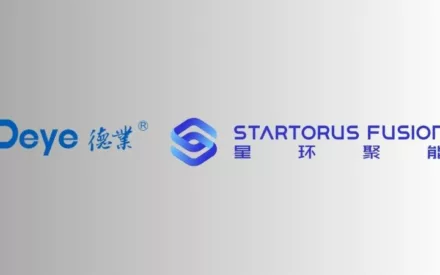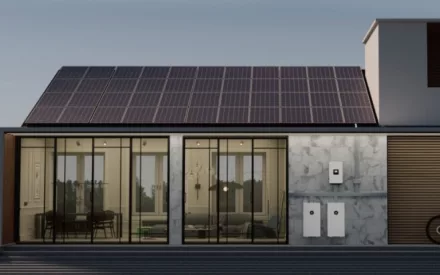What Happens to Solar Power When Batteries Are Full: Managing Excess Energy
Understanding Solar Battery Charging
In a solar power system, effective battery charging is critical to maximizing both efficiency and battery life. This requires a sophisticated balance between your solar panels, the charge controllers, and the batteries themselves to ensure energy is managed correctly.
The Role of Charge Controllers
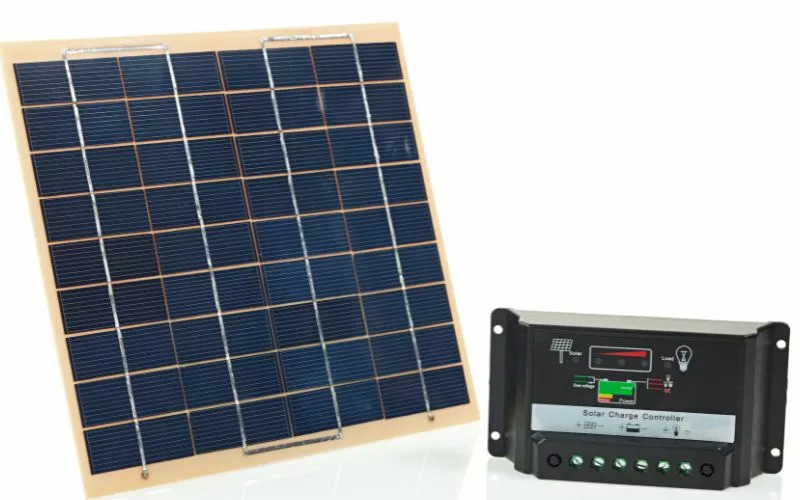
Charge controllers are integral to safeguarding your solar batteries as they prevent overcharging, which can reduce battery life. When solar panels absorb sunlight, they generate electricity, but the energy produced is often more than what your batteries can store at full charge. Charge controllers precisely regulate the electrical flow, allowing batteries to reach their full capacity without exceeding it. For systems without grid-tied solutions, excess energy that cannot be stored or redirected can be wasted. The controller essentially acts as a gatekeeper, ensuring that each battery receives the right amount of charge as per its capacity.
State of Charge and Battery System Life
Battery life is largely dependent on how well the state of charge (SoC) is maintained. The SoC represents the current battery capacity as a percentage of its total capacity. Maintaining an appropriate SoC is crucial for preserving the overall battery life. Your battery management system (BMS) plays a significant role in this aspect; it monitors the SoC and adjusts the intake from your solar panels accordingly.
A battery at 100% SoC signifies a full charge, and at this point, the BMS will signal the charge controller to cease charging to avoid damaging the battery. Solar power batteries need to avoid being kept at either extreme—fully drained or fully charged—for extended periods to prevent degradation of battery capacity. Proper SoC management not only prolongs battery life but also ensures that your solar power system operates at peak efficiency.
Grid-Tied Solar System Interaction
When your solar panels produce more electricity than your home can use, grid-tied systems manage this excess power in efficient ways, involving the utility grid.
Net Metering Benefits
Net metering is a key feature of grid-tied solar systems that benefits you directly. With net metering, the surplus solar power you generate is fed back to the electrical grid, and you receive credits on your utility bill. Essentially, when your system’s batteries are full, the extra electricity turns the meter backward, providing financial compensation for the renewable energy you contribute.
Feeding Excess Solar Power to the Grid
When batteries reach full capacity, grid-tied solar systems have the capability to feed excess solar power back to the utility grid. This not only offers potential savings on your electrical bill through net metering credits but also helps in bolstering the grid’s supply of energy with clean, renewable power. Remember, the process is seamless; you don’t need to do anything as the system automatically redirects the excess electricity to the grid.
Off-Grid Solar System Solutions
When your off-grid solar system’s batteries are fully charged, the management of excess solar power is vital to the longevity of your system. You need a strategy in place to use this extra energy efficiently or to prevent it from causing damage to battery storage.
Utilizing Extra Energy in Off-Grid Systems
In off-grid setups, you can direct excess solar energy toward dump loads. These are high-power-consuming appliances that are only activated once your batteries reach full capacity. For instance, you could use excess electricity for water heating, which can act as a thermal store. This approach ensures the energy produced by your solar panels is not wasted.
On the other hand, if you have a solar generator, it can act as a secondary storage option, allowing you to use the stored energy for different purposes or at a later time. It’s crucial that these systems are integrated with a charge controller, which ensures that energy is properly diverted and handled without overcharging the batteries.
Importance of Battery Storage
The cornerstone of an efficient off-grid solar system is battery storage. Your batteries store solar power for use when generation is low, making sure you have a continuous supply. With proper storage capacity, you can optimize the usage of solar energy and minimize reliance on backup generators.
Your system should include a charge controller to prevent battery overcharging and extend its lifespan. When managed correctly, your battery storage can maximize the utility of excess solar power, providing you with an autonomous and reliable energy source around the clock.
Managing Overcharging Risks
When your solar batteries reach full capacity, managing overcharging risks becomes essential to preserve the lifespan and efficiency of your system. It’s important to have mechanisms in place that will prevent added energy from causing damage.
Preventing Battery Overcharging
Charge Controllers play a pivotal role in protecting your solar batteries. They monitor the voltage level and heat to prevent overcharging. When your batteries are full, the charge controller intervenes by regulating the power flow, ensuring the batteries do not receive more charge than they can handle. These devices can also redirect excess energy or simply cut off the power from your solar panels to prevent any damage.
The Impact of Overcharging on System Efficiency
Overcharging can diminish the overall system efficiency and longevity of your solar batteries. Excess voltage can generate heat, leading to reduced battery life and potential system failures. A Battery Management System (BMS) is critical for maintaining balance and monitoring the state of your solar batteries to avoid these issues. By keeping a check on the charge state, a BMS ensures that the batteries operate within their safe limits, thus fostering efficient energy use and storage.
Solar Power System Monitoring and Maintenance
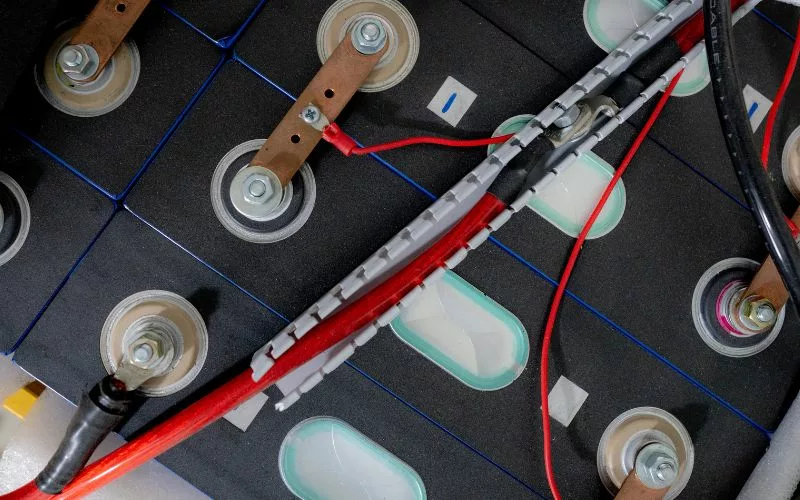
Proper monitoring and maintenance of your solar power system ensure efficiency and longevity. By keeping tabs on the state of your batteries and regularly verifying system operations, you can prevent overcharging and optimize energy usage.
The Role of Battery Monitors
A battery monitor is an essential component in managing your solar power setup. This device provides critical information about the state of your batteries, such as voltage, current, state of charge, and overall health. Reliable battery monitors can alert you when the batteries reach full capacity, ensuring that the inverter can take appropriate action to manage excess energy, whether that’s diverting it or temporarily ceasing power acceptance to protect against overcharging. This vigilance is crucial in prolonging your batteries’ lifespan and guarantees that the stored direct current (DC) is used effectively to power your appliances when needed.
Regular System Check Using Multimeter
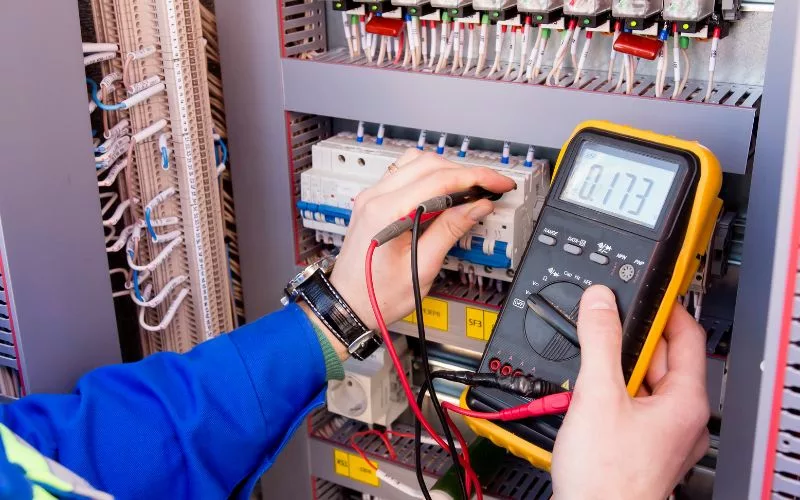
Routine inspections using a multimeter are a part of thorough system maintenance. This tool allows you to measure the alternating current (AC) and DC output of your solar panels and the input to and from your batteries. You can check for any discrepancies that could indicate potential issues, such as unexpected power drops or surges that can harm your system’s components. Moreover, a multimeter can also help you verify the integrity of electrical connections and the performance of your inverter, ensuring that the conversion of DC from your panels to AC, which powers most home appliances, is efficient and safe.
By combining the use of a battery monitor and a multimeter, you have a comprehensive approach to maintaining your solar power system’s health, which will contribute to a more efficient, reliable, and safer energy solution for your home.
Optimizing Energy Usage with Excess Solar Power
When your solar panels produce more electricity than your batteries can store, you’ve encountered what’s known as excess solar power. Wisely optimizing this extra energy can significantly enhance your system’s efficiency and contribute to more sustainable power management.
Smart Storage Solutions
- Consider expanding your storage capacity. More batteries mean more room for your surplus power, providing a buffer for high-consumption days or less sunny periods.
Direct Appliance Control
- Utilize the extra energy for refrigeration, potentially cycling your refrigerator more often during peak solar hours.
- Power air compression systems, when excess solar energy is available, store compressed air for use in pneumatic tools or other devices.
- Divert surplus power to your water heater, reducing reliance on the grid and lowering electricity bills.
Load Shifting
- Plan energy-intensive tasks for times when your panels are most productive. Doing so aligns energy demand with peak production, ensuring you maximize the use of renewable energy sources.
Automated Management Systems
- Install a system that automatically redirects excess power where it’s needed most. Innovative energy controllers divert surplus to appliances, storage, or even back to the grid if applicable.
By proactively managing excess solar power, you ensure every kilowatt is put to good use. Your system becomes not just a source of energy, but a sophisticated tool for smarter, greener living.
Frequently Asked Questions
What does a solar charge controller do when the battery is full?
When your battery reaches full charge, the solar charge controller intervenes to prevent any further energy from being transferred, safeguarding the battery from potential overcharge.
How can you prevent overcharging a battery with a solar panel?
To prevent overcharging, make sure your system includes a reliable charge controller that detects full battery status and stops energy flow, maintaining the battery’s health and longevity.
Do batteries stop charging when solar panels produce excess energy?
Yes, batteries will cease charging when they are full, and any excess energy from the solar panels during this state could be redirected, used for other loads, or wasted depending on your system setup.
What are the implications of having no load on solar panels?
If there is no load on the solar panels, such as when batteries are full, and there’s no excess energy consumption, this could lead to a temporary rise in voltage, which might be less efficient for the system.
What occurs to the surplus electricity generated by solar panels off-grid?
For an off-grid system, surplus electricity can be redirected into additional storage, used immediately if there’s demand, or in certain setups, it could be wasted if no additional pathways for the excess energy exist.



